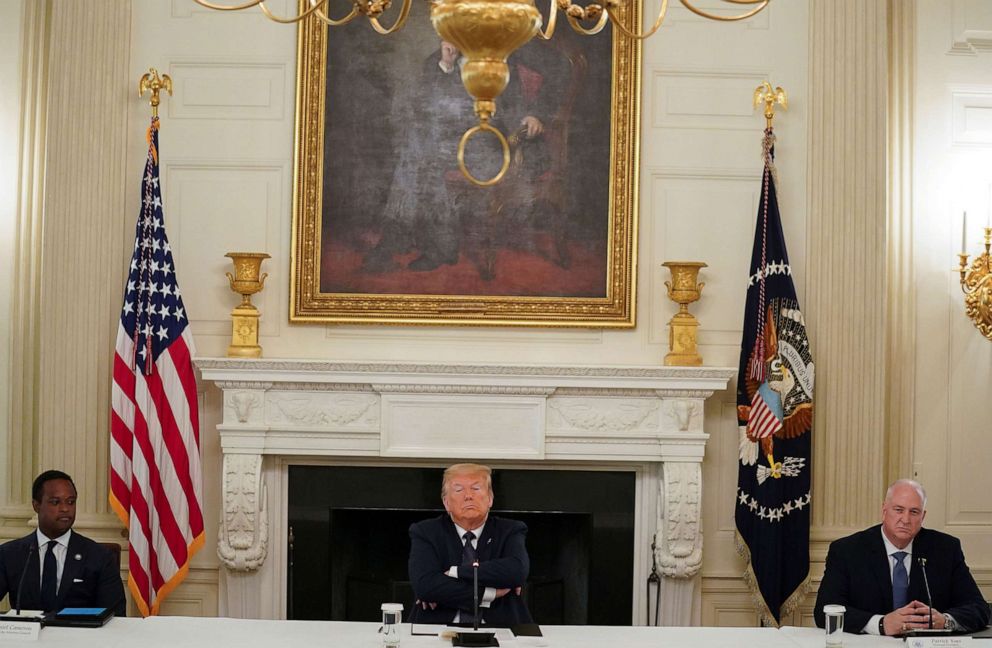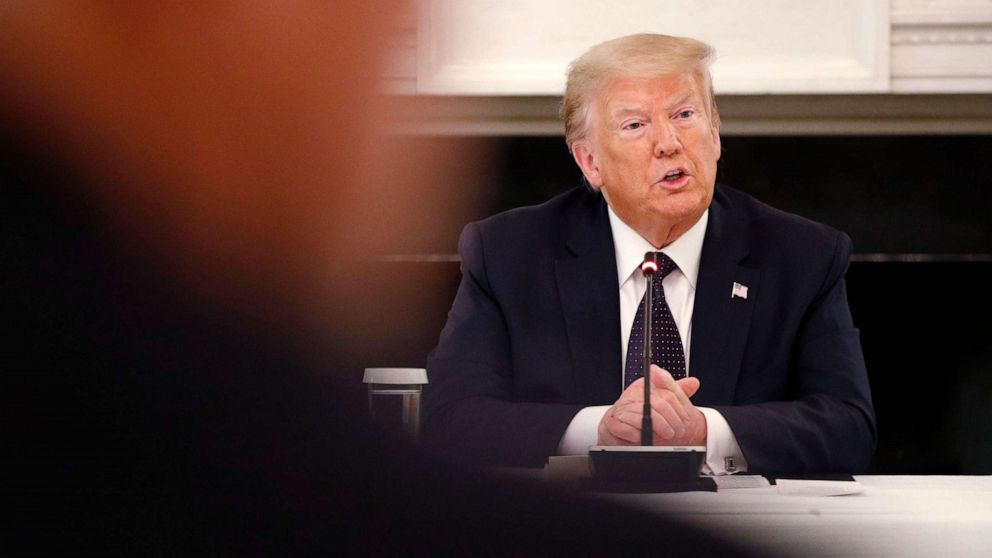As Trump struggles to respond to crises, internal polling instills fear in advisers: Sources
One week ago President Donald Trump met with advisers from his 2020 re-election campaign, who greeted him with bad news.
The campaign's internal poll numbers showed the president down in swing states, and down with key demographics of voters including women and independents.
The messaging from the White House on the coronavirus pandemic and the growing anger about the brutal killing of George Floyd in Minneapolis was fueling a drop in his numbers. Top aides warned that former Vice President Joe Biden, now the presumptive Democratic nominee, was positioned to defeat the president by a significant number of electoral votes based on the campaign's analysis, according to multiple sources familiar with the meeting.
While some of the president’s advisers insisted the current campaign internal poll numbers aren’t relevant in gauging Trump’s re-election chances this far from November, others among his most loyal and longest serving advisers have developed a new posture: one of increasing alarm. They fear that without a course correction -- and quickly -- Donald Trump could lose the 2020 presidential election.
This account of the president and his advisers' struggle to respond to the ongoing crises and the political fallout is based on conversations with 17 sources including White House officials, campaign advisers and sources close to the president.

In the wake of the murder of George Floyd on May 25, some White House officials have been lobbying the president to give a formal address to the nation from the Oval Office to show he was taking the death and the growing protests around the country seriously. White House Chief of Staff Mark Meadows was in favor of the idea. Meadows believed it was a moment for the president to deliver a message of unity, according to sources familiar with his thinking.
Others, like the president’s son-in-law and senior adviser Jared Kushner, were against such an address, arguing it could do more harm than good, according to four sources. A source close to Kushner disputed that categorization, saying instead the goal has been to announce a policy initiative that will have an impact.
The president has also been encouraged to participate in listening sessions with African American leaders, as he has hosted previously at the White House. But that idea was rejected by the commander-in-chief, according to sources.
A person who has attended similar events as a guest of the president previously told ABC News they heard from a White House official to "be on standby" for an event with the president, but then nothing ever materialized.
Trump is "not capable of showing empathy here," said the source, who is still a loyal supporter of the president.
Vice President Mike Pence, on the other hand, has participated in a number of listening sessions on the issue.
Meanwhile, earlier this week Trump held a roundtable with some law enforcement officials, but even then some sources in the White House took issue with the meeting because the number of White House staff seated around the table outnumbered the outside attendees.
The White House is preparing to announce a number of proposals later this week related to race and policing, but the rollout has yet to be determined.
Many top advisers concede that these proposals are often overshadowed by controversial statements coming from the president’s Twitter account. Days in the West Wing are so often dictated by what he tweets and impact whatever the goal for the day was initially set out to be.
One such incident occurred on Tuesday when the president tweeted to his over 80 million followers promoting a conspiracy theory where he made unfounded allegations against a 75-year-old protester, Martin Gugino, who was pushed to the ground by police in Buffalo, N.Y. last week and was seen bleeding from the head, motionless. At the time of the tweet Gugino was still in the hospital, and the two police officers involved in the incident have been charged with assault. The president was citing a bizarre report by fringe right-wing television network One American News, or OANN.
White House Press Secretary Kayleigh McEnany defended the tweet, saying the president was raising some "legitimate" questions. An attorney for Gugino called the president's accusations "dark, dangerous and untrue."
Multiple aides said they have now even opted to turn off notifications for "@realDonaldTrump,” the president's personal Twitter account. "What's the point?” one adviser told ABC News.
Meadows, who was on Capitol Hill Tuesday for meetings, refused to defend or comment on the tweet when asked multiple times by reporters.
However, two other outside advisers to the president instead said it wasn’t the president’s rhetoric that was problematic -- adding that’s in part how he won in 2016 -- but rather they took aim at Trump campaign manager Brad Parscale's running of the campaign, while noting that daily campaign decisions must be run by Kushner first.
Those who represent the president in media have struggled for guidance on messaging directives from the campaign. In the wake of Floyd's death and the growing calls for police reform, some advisers have been pushing the campaign for a defined message on some Democrats pushing a Defund the Police movement, believing it could help the president gain back some lost ground from the past few weeks.
Erin Perrine, a spokesperson for the Trump campaign, told ABC News that the campaign's data "shows that in key states we track, the President is strong against a defined Joe Biden."
In response to a request for comment for this report, White House Deputy Press Secretary Judd Deere said the president has "accomplished more at this point in his first term than any President in history," including in the White House's estimation saving "millions of lives" with the pandemic response and "restor[ing] law and order to our streets."
But a growing chorus of Republican advisers outside and inside the White House also believe Kushner is alienating the president's voter base because he is too moderate a force.
Fox News host Tucker Carlson said last week that "no one has more contempt" for Trump's voters than Kushner, taking him to task over his support of a program to "let more criminals out of prison and back onto the street." Carlson was talking about the First Step Act, a largely bipartisan criminal justice reform bill that sought to reverse some of the excesses of the drug war, mostly by granting relief to longtime convicts with nonviolent drug offenses.
White House sources and outside advisers have echoed that sentiment. One White House source told ABC News Kushner "assumes our base is going to go along with anything we say" and accused him of intentionally driving the president in the wrong direction.
A source close to Kushner pushed back, saying, "This is consistent -- people are constantly trying to cause separation between Jared and the president but they've been unsuccessful because the president knows Jared’s track record of success and his ability to stop bad actors from gaining influence.
“That obviously creates a desire to have him [Kushner] removed but his relationship with the president is as close as it’s ever been," the source said.
Trump also has felt stuck in the White House, and advisers claim he’s antsy to get back on stage and speak to the large crowds who gather for his political rallies.
The coronavirus pandemic halted campaign travel for nearly three months, and his campaign was forced to hold events virtually.
Trump is slated to return to the campaign trail next week, and the campaign has already sparked controversy for choosing to host the first rally since the coronavirus pandemic in Tulsa, Oklahoma -- the site of the Tulsa Race Massacre in 1921 -- and on Juneteenth, an annual holiday commemorating the end of slavery.
The president has been tweeting there is a "big demand" for such events. Campaign officials are banking on the massive protests in recent weeks dampening criticism over holding large events in person, according to multiple sources.
Multiple sources in the White House and on the campaign are hopeful giving the president the platform again of massive crowds will provide him with an opportunity to air his grievances and move on, rather than harping on issues that have been unhelpful to his re-election efforts.
The president, who is known to call multiple advisers and friends outside the White House in addition to speaking to White House and campaign aides daily, is also listening to the advice of most everyone who gets in his ear, sources said. But that includes advisers who some aides view as problematic.
Several sources particularly pointed to Jenna Ellis, the president’s campaign legal adviser who's repeatedly sparked controversy over comments she's made on social media, including last month specifically attacking female White House reporters of color on Twitter for asking what she called “stupid questions” at press briefings.
Ellis also mocked Dr. Anthony Fauci, a leading member of the White House coronavirus task force, tweeting that she trusted "the local weather forecast" more than the nation's leading infectious disease expert.
Ellis has been “in [Trump’s] ear a lot lately,” one source said, calling her a “bad influence” who is giving the president poor legal advice.
When reached by ABC News, Ellis declined to comment on what counsel she provides the president beyond saying her conversations with him are privileged.
“Any legal advice that I give [President Trump] or those conversations are legally privileged,” Ellis said.
When asked whether she consults with the White House counsel’s office on legal matters, Ellis refused to say.
“Legally he is the client so is the holder of the privilege, not me,” she said.
One top adviser told ABC News the president seeking advice through various channels is a good thing.
"He's not yelling, he's not hanging up, there have been long talks with him which means he is processing everything," the adviser said.




